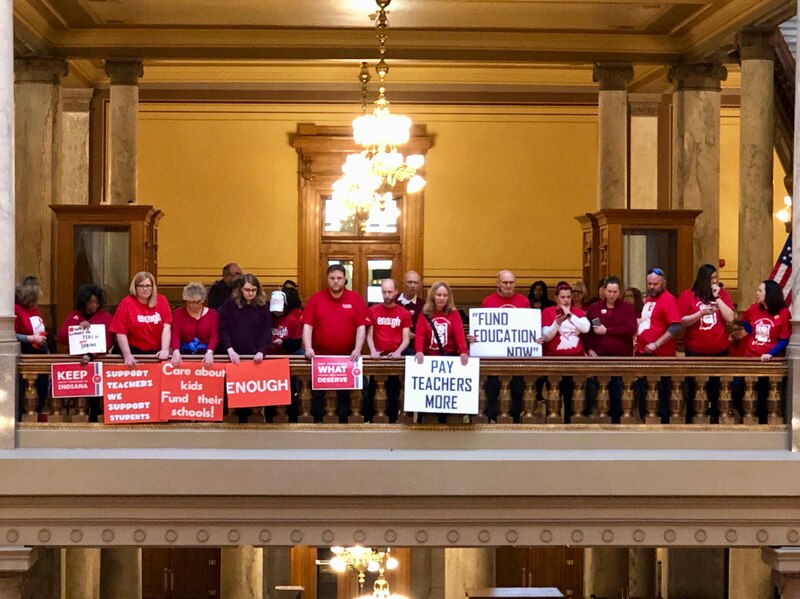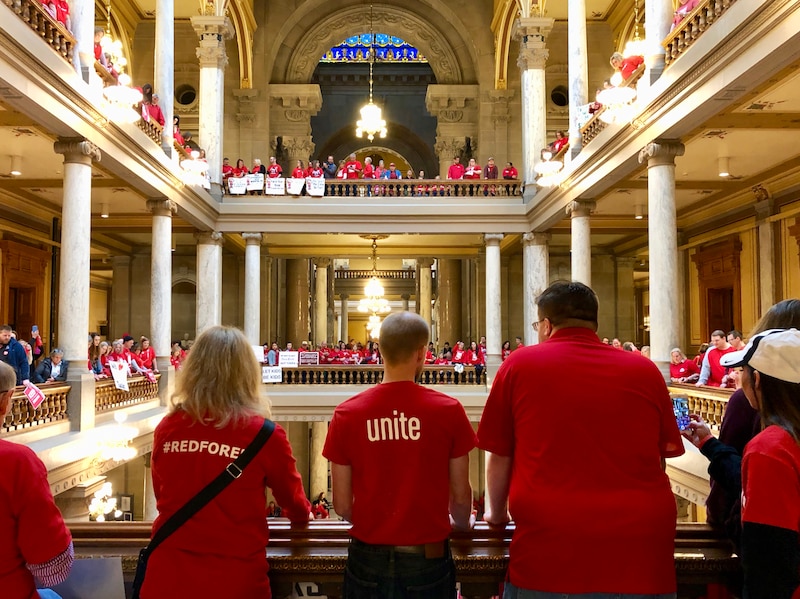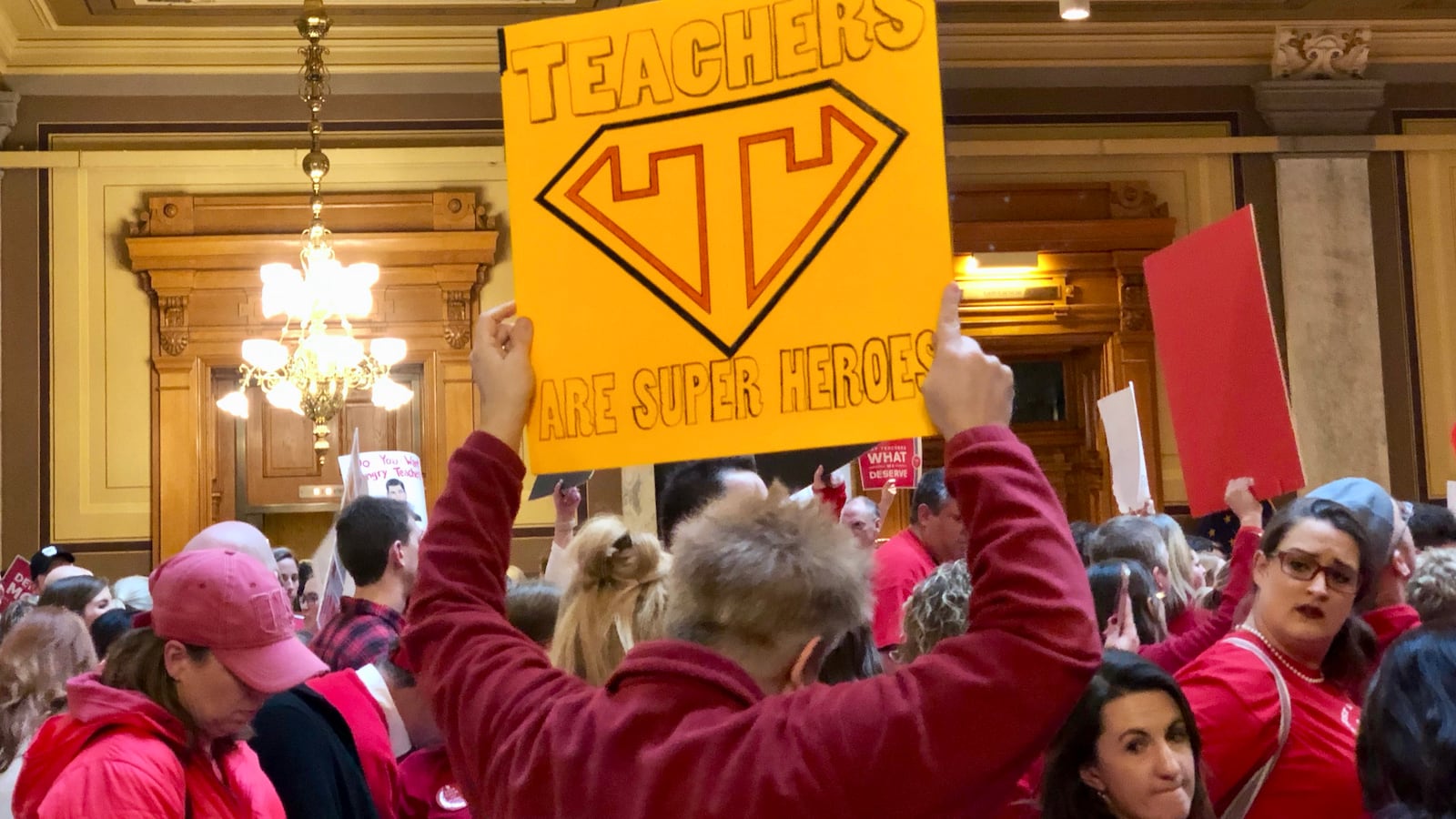More than 1,000 teachers and their supporters from across Indiana gathered at the state Capitol on Saturday afternoon to demand higher pay and more school funding, a call they say lawmakers have long ignored.
“Senators, representatives, listen to teachers: Give us the resources we need, give us the professional salary we deserve, and respect our profession,” said Connor McNeeley, a member of the union in Perry Township who spoke to the crowd. “What’s best for teachers is what’s best for students.”
The rally, hosted by the Indiana State Teachers Association, the state’s largest teachers union, comes as teacher salaries have dominated this year’s legislative debates. Indiana teachers have largely not organized more aggressive protests, such as the walkouts or strikes that their peers have recently held in other states. But Saturday’s protest was one of the first showings of widespread, unified action by Hoosier educators.
With lines still snaking out doors on both sides of the Statehouse nearly an hour past the scheduled start time, the rotunda was filled with adults and children in red shirts showing their union support. Teachers and their friends and families crowded around two floors of railings overlooking the stage on the main floor, occasionally bursting into loud chants that echoed off the walls and marble floors.
“You’ve left us no choice, you made us use our teacher voice,” they shouted. Other chants were directed at Gov. Eric Holcomb: “Hey Holcomb, do what’s right, join us teachers in our fight.”

Holcomb and lawmakers have put forth several proposals this year to push more money to teachers, but some educators and education advocates have raised concerns that the plans don’t guarantee raises at a time when higher salaries are attracting Indiana teachers to higher-paying states. Instead, under the proposals, local districts would have to choose to add any additional money they get from the state or savings from driving down other costs to teacher paychecks.
Sarah Wintin-Guthrie, a U.S. history and economics teacher at Perry Meridian High School in Indianapolis, came to the rally after running a six-mile race that morning. She said if the state really wants to direct more money to teachers, legislators shouldn’t leave it up to chance or the goodwill of district decision-makers.
“As a social studies teacher, I’m a big fan of civic engagement and encouraging that in my students — practice what you preach” Wintin-Guthrie said. “If it’s supposed to be for a teacher pay increase, make sure it’s for a teacher pay increase.”

Although Holcomb and lawmakers have touted their close work this year with teachers unions and teacher-focused advocacy groups, ISTA president Teresa Meredith told rally-goers that it’s not enough. Last week, Holcomb said he hoped teachers wouldn’t walk out, arguing that he and lawmakers were “not walking out on them, we’re walking to them.”
“Well I’d say, governor, come closer,” Meredith quipped. “We must make more significant strides.”
The measures pushed by lawmakers are fairly small compared to the hundreds of millions of dollars likely needed if the state were to give significant raises to teachers statewide. House lawmakers are proposing to preserve a controversial merit-based bonus pool, at $30 million per year. And bills that would offer schools funding for “residencies” to give new teachers more support early on and provide grants for districts that create leadership roles and mentoring opportunities for teachers would be funded with $6 million over two years.
Indiana Democrats have pushed for more dramatic changes, such as giving every teacher in the state a 5 percent raise. Several Democrats were present at the rally, including Rep. Sheila Klinker, from Lafayette, Rep. Melanie Wright, from Yorktown, and Rep. Tonya Pfaff, a new lawmaker from Terre Haute. All three are former or current teachers.

Jackie Morgan, a 42-year English teacher from Arsenal Technical High School in Indianapolis Public Schools, said she came to the protest to do her part as a union member and stand up for better pay and more respect for teachers in the state.
“Anything that can help teachers get more pay, more benefits — I know we can’t do much because the state has tied our hands,” Morgan said. “Whatever I can do to protest, I will.”

